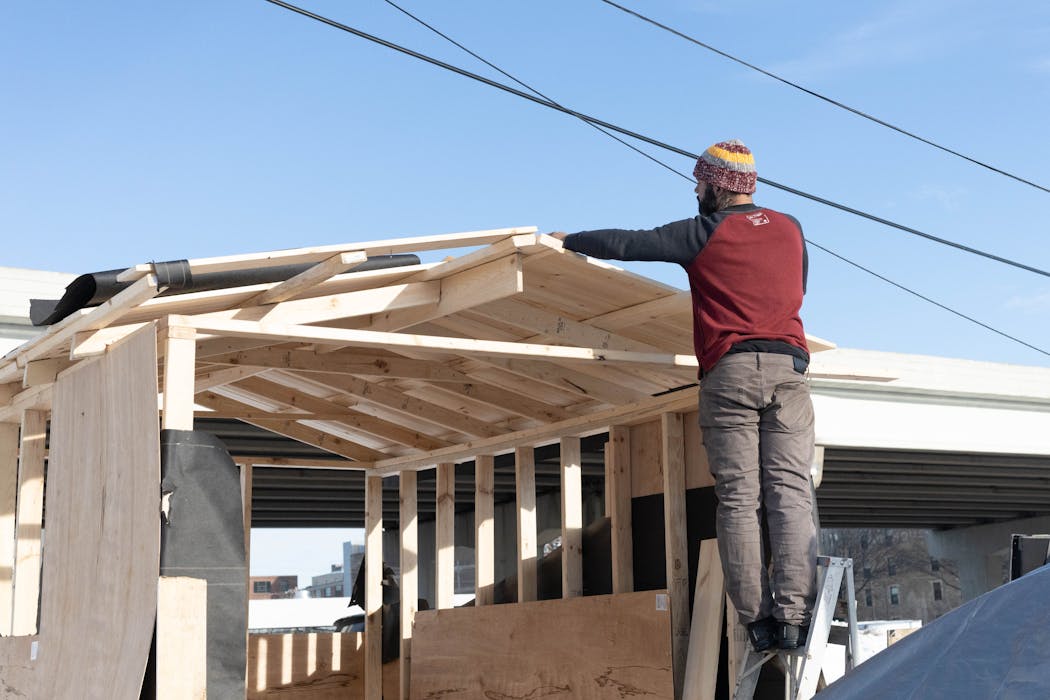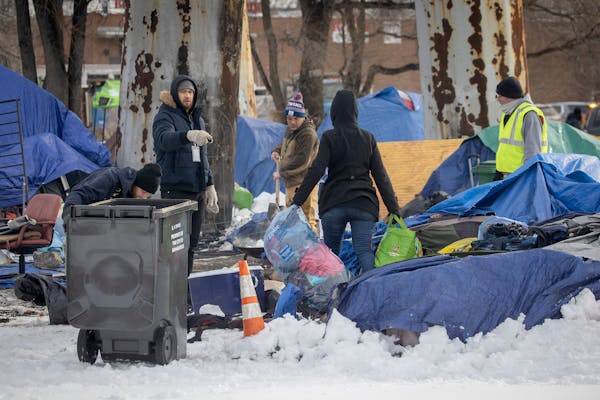In early December, residents of a homeless encampment in the North Loop neighborhood of Minneapolis and artist Jim Hillegass together built a wooden shelter, barely larger than an icehouse, of pine studs, plywood and tar paper.
But the tiny house soon caused a stir. Last week, the Minneapolis officials asked the Minnesota Department of Transportation (MnDOT) to remove it because the city prohibits temporary structures for human habitation on public or private premises, and the house was built on MnDOT land.
Encampment residents responded by dragging the house into the camp to save it.
Then Tuesday night, Hamoudi Sabri, who owns the land where the encampment was established, went to the site with a crowbar and dismantled the tiny house. Sabri said he did not want to be liable for potentially illegal structures built on his property. But he said the people living on his land could stay.
Sabri is a developer who owns numerous buildings on East Lake Street and had bought several parcels on North 5th Street in the North Loop in hopes of building a high-rise. Then the pandemic hit. He abandoned hope for a large development and considered building a dog park instead.
But over the summer, tents appeared on the land.
Sabri said he was motivated to keep the camp by what he perceived as the city's insufficient response to the crime along Lake Street since the unrest that followed George Floyd's murder in 2020, as well as the increasingly visible homelessness crisis.
"It amazes me how the North Loop gets treated, downtown Minneapolis, because of rich people, and how I get treated down on the other side of Lake Street," Sabri said. "You make a 911 call on Lake Street, and [police] don't show. Even with gunshots, it takes them half an hour. … But when it comes to North Loop, they all jump."
"I started seeing the discrimination, and I saw selective enforcement. That triggered me … to where I'm demanding to have a solution to homelessness, period."
Sabri calls the shots at the North Loop camp, allowing people to stay as long as they don't cause trouble or deal drugs. Periodically, he asks individuals to leave.
Dozens now live there in an ever-changing tent community with walking paths carved out of the snow. The city provides trash collection and portable toilets. Water comes from a spigot on the east side of camp. Every Monday, outreach workers canvass the residents, offering housing assessments and delivering Narcan, hygiene bags, HIV services and vaccinations.
After the city closed the Sheridan encampment in northeast Minneapolis on Wednesday, a few tents relocated to the North Loop encampment.
The city estimates it has a total of 16 camps, including two on private property and just one where the owner has welcomed the inhabitants to stay indefinitely.
"The city and county, they're paralyzed with solving the homelessness problem. But somebody built one tiny house … and they finally have a stern and timely response," said Nikki Carlson, who works in the North Loop and volunteers to bring food and pallets to the encampment.
At least 20 North Loop camp residents are in various stages of the housing intake process, but no one has been housed yet, said Erin Wixsten, Hennepin County principal planning analyst.
"This journey and trajectory is completely dependent on the individual needs and barriers of each household and the options that are available to them," Wixsten said.
As temperatures dropped, neighborhood tensions rose. The North Loop Neighborhood Association, which had supported the Avivo tiny house indoor village as well as the Better Futures center for formerly incarcerated men, discussed the encampment during its October meeting. About 50 people attended and expressed concern for the prevalence of needles, theft and graffiti in the area.
"I can speak for myself. I can speak for my wife … we are really sensitive to homelessness, addiction, people who are struggling with poverty," said photographer Laura Migliorino, who lives near the encampment and occasionally delivers clothing there while walking her Chihuahua.
But Migliorino said the encampment poses a challenge to friends in the neighborhood who are in recovery and those enrolled in the Salvation Army's residential treatment center.
"We have people who are desperately trying to get sober or off drugs, who are literally staring at a trigger every day," she said. "We don't think people should be living outside. I don't think that's cruel."
City representatives said they are working with Sabri to disband the encampment before a hard winter sets in.
But evicting its residents is not as straightforward as it might be if the camp were on public land. Sabri has threatened to fight, including legal action, if the city tries to sweep the tents before finding a better home for residents.

Want to share info with the Star Tribune? How to do it securely

'Safe recovery sites' would offer syringes, naloxone and more to people using drugs. The plan could be in peril.
New Minnesota GOP leaders seek peace with party's anti-establishment wing

Who is Republican Lisa Demuth, Minnesota's first House speaker of color?



